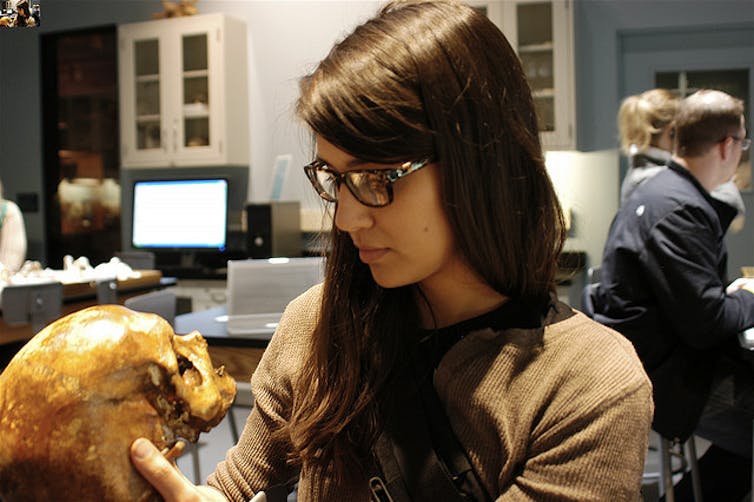A new paper on teaching critical thinking skills in science has pointed out, yet again, the value of giving students experiences that go beyond simple recall or learned procedures.
It is a common lamentation that students are not taught to think, but there is usually an accompanying lack of clarity about exactly what that might mean.
There is a way of understanding this idea that is conceptually easy and delivers a sharp educational focus – a way that focuses on the explicit teaching of thinking skills through an inquiry process, and allows students to effectively evaluate their thinking.
What are thinking skills?
Let’s first understand what we might mean by thinking skills. Thinking skills, or cognitive skills, are, in large part, things you do with knowledge. Things like analysing, evaluating, synthesising, inferring, conjecturing, justifying, categorising and many other terms describe your cognitive events at a particular functional level.
Analysis, for example, involves identifying the constituent elements of something and examining their relationships with each other and to the whole. One can analyse a painting, a piece of text, a set of data or a graph.
Analysis is a widely valued cognitive skill and is not unique to any discipline context. It is a general thinking skill.
Most syllabuses from primary to tertiary level are organised by content only, with little mention of such cognitive skills. Usually, even if they are mentioned, little is said about how to teach them. The hope is they will be caught, not taught.
Rigour in course design is too often understood as equating to large amounts of recall of content and specific training in algorithms or set procedures. It is far less common, but far more valuable, to have courses in which rigour is found in the demand for high-level cognitive skill formation.
This is not to say that knowledge is not important in the curriculum. Our knowledge is hard won; we should value what we have learned for how it makes our lives more productive or meaningful.
But there is nothing mutually exclusive about developing high levels of cognitive skills with content knowledge in a discipline context. It just demands attention to these skills, using the content as an opportunity to explore them.

It is knowing how to provide students with these skill-building opportunities in context that is the mark of an outstanding teacher of effective thinking.
After all, we do not expect the scientific, cultural and political leaders of tomorrow simply to know stuff. They must also know what to do with it.
Why inquiry is necessary
These skills are not something students can learn just by hearing about them. They need to be given experiences in which they are required to do them. The cognitive skills involve a learning how, not just a learning that.
This is why it’s not possible to develop effective thinkers by relying on didactic teaching methods, in which students are seen as passive recipients of the knowledge passed down by the teacher.
Just as it’s impossible to learn how to surf without getting on a board, it’s impossible to master cognitive skills unless you experience the need to use them.
Inquiry learning provides these necessary experiential opportunities.
There are many ways in which inquiry is understood educationally, and it usually describes a very broad approach characterised by a focus on active student involvement in the learning process.
Let me provide a narrower educational definition: inquiry is a process in which students are required to utilise a range of cognitive skills to formulate and solve problems.
An example of a task that requires only a narrow range of cognitive skills might be one that gets students to apply a learned procedure to construct a piece of art or experimental apparatus. The cognitive skills involved might include recall with some simple application.
If students were asked to evaluate existing examples of the above, with a view to modifying them to suit particular purposes or situations, and to explain their processes in doing so, then the skills of conjecture, analysis, evaluation, justification and communication can come into play.
The second example is more indicative of inquiry learning as a result of its demand for deeper and broader use of cognitive skills.
Let me also add another proviso, particularly to the end of developing good thinkers: to effectively learn to inquire, students must be aware of the cognitive processes they are experiencing. That is, they must be aware of their thinking - they must be metacognitive.
Talking about thinking
To think about our thinking, we must be able to talk about our thinking.
The cognitive skills describe our thought processes and hence provide a language in which we can discuss our thinking, at least in terms of learning to think well. This also provides a language in which to give students feedback on how they are going.

To stick with the example of analysis, we might say that an analysis was quite broad, but did not go deeply enough, or that it analysed some areas in depth, but did not extend to all elements.
Students can use such feedback reflectively and internalise this advice to develop their own autonomous systems of evaluation. Metacognition is therefore a necessary condition for students to improve their thinking.
Moving our educational focus from knowledge to inquiry allows for the development of effective thinking. Inquiry requires students to build strong cognitive skills that extend beyond simple recall or application of learned procedures into genuine critical thinking.
No school could teach students all the knowledge they need to survive in a rapidly evolving society. But we could teach them how to think in a way that works for the knowledge they will learn in the future.
That’s what learning for life really means.

